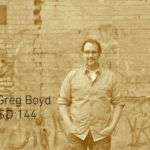We run our website the way we wished the whole internet worked: we provide high quality original content with no ads. We are funded solely by your direct support. Please consider supporting this project.

A Jesus Kind of Church
The church can only be the conduit of God’s love if it stops judging others (See yesterday’s post). This means that it will stop being concerned about its reputation in the eyes of those who practice this religious judgment. The only reputation we need be concerned with is to have the one Jesus had. He was known for his unprecedented love, by those who would receive it, and scorned for his irreligious attitudes, by those who would not.
Jesus’ religious reputation was tarnished in the eyes of religious people because he did not honor many of the religious taboos of his day. Walking in unity with the Father, Jesus possessed a joyful freedom—a kind of recklessness—that was scandalous to those whose worth was derived from their supposed ability to judge good and evil. Jesus hung out with women, some of whom had tarnished reputations. He fellowshipped with tax collectors, drunkards, and other sinners. He healed and fellowshipped with lepers. He praised Gentiles, Samaritans, and even prostitutes and tax collectors over respected Jewish religious leaders.
Among the religious, Jesus’ reputation was dishonorable. But Jesus wasn’t concerned about his reputation. Jesus came to heal the sick, not to placate the religious sensibilities of those who thought they were healthy (Mark 2:17). To heal the sick, you have to love the sick. And this means you have to ignore what those who (mistakenly) think they’re healthy think about you!
The singular task of the church is to replicate this eternal, reckless love to the world. One indication that we are doing our job well is that sinners on the fringes of society will be enjoying fellowship with us, as they did with Jesus. Another indication, directly resulting from this, is that those who judge by religious standards (they eat from the Tree of Knowledge of Good and Evil) will judge us.
If, for example, a church treats the LGBT community with the same compassion religious judges extend toward divorced folks or people who struggle with weight issues, its leaders will likely be condemned as “compromising the Word of God” by these judges. Such a church is sinning against the (self-serving) knowledge of good and evil from which the religious judges feed. Consequently, the judges will likely feel as though their god has been assaulted, and, as a matter a fact, it has! As idolatrous people often do when their gods are threatened, they may rage. They did so with Jesus, and they will do so today when a church looks like Jesus.
A church that celebrates the cessation of judgment and loves as God loves has to be willing to have their reckless love scorned as compromising, relativistic, liberal, soft on doctrine, or antireligious. After all, what kind of church attracts and embraces prostitutes, drunkards, gays, and drug addicts? What kind of church routinely has smokers, drinkers, gamblers, and bums ushering in their services, hanging out in their small groups, singing in their choir, signing up for classes, etc.—without anyone immediately confronting their sin? What kind of church would accept a woman who was still living with a man out of wedlock after having gone through five marriages? (See John 4:1-26). What kind of church blurs the boundary between those who are “in” and those who are “out” to this degree?
The answer is a Jesus kind of church.
—Adapted from Repenting of Religion, pages 196-198.
Photo credit: racineur via Visualhunt / CC BY-NC-ND
Category: General
Tags: Church, Judgment, Love, Religious Idolatry
Topics: The Church
Related Reading

The Purpose of the Church
Concerning the preaching of the Gospel, Paul wrote that God’s intent was that “through the church the wisdom of God in its rich variety might now be made known to the rulers and authorities in the heavenly places … in accordance with the eternal purpose that he has carried out in Christ Jesus our Lord”…

Christianity and American Politics
Greg was recently featured in Missio Alliance’s Seminary Dropout podcast to share his thoughts about the role of Christians in American politics. Today we’re sharing part 1 of that conversation. What is the role of the Christian in American politics? Should Christians vote? In this election filled with scandal and unprecedented vitriol, how can we display…

Love Never Stops
Greg reflects here that he can be a very cynical person if you ask him about the state of the world around us, but the love of God demonstrated in the Easter narrative gives him confidence and hope. We hope this blesses you as you move through holy week. You can find more videos like this…

Jesus and those “Other People”
Adele Booysen via Compfight Nicky Marshall is the husband of one wife (Raquel), father or two boys (Nathan and Elijah) and serves as assistant pastor at The Living Room Church in Barbados. Nicky is also an Artist and Surfer. He blogs here. “This is Ferozah”. I instinctively stuck my hand out to greet a smiling Muslim…

The Greatest Mystery of the Christian Faith
God has always been willing to stoop to accommodate the fallen state of his covenant people in order to remain in a transforming relationship with them and in order to continue to further his sovereign purposes through them. Out of love for humankind, Scripture tells us, Jesus emptied himself of his divine prerogatives, set aside…

The Challenge of Malala to the Church
http://youtu.be/f506lCk6Tos I don’t know if you’ve seen this, but it’s Malala Yousafzai appearing on Jon Stewart’s The Daily Show. At the age of 14 Malala was shot in the face at point blank range by the Taliban while riding to school on a bus, all because she wouldn’t stop speaking up for the right of…
